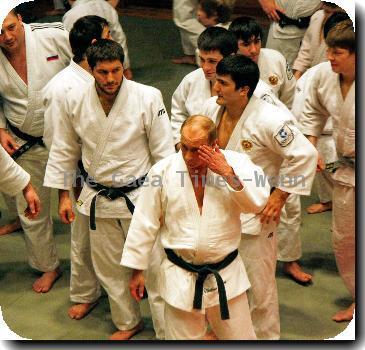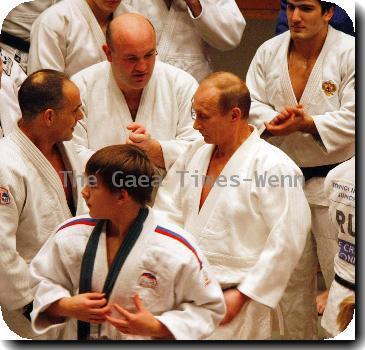Putin proposes Russia’s gas giant Gazprom merge with Ukraine’s state company Naftogaz
By David Nowak, APFriday, April 30, 2010
Putin proposes Gazprom, Ukraine’s Naftogaz merge
MOSCOW — Russian Prime Minister Vladimir Putin proposed Friday that the country’s gas giant Gazprom merge with Ukraine’s state gas concern Naftogaz, an idea analysts said seemed unfeasible but another sign of Russia’s intention of increasing its influence there.
Speaking at a televised meeting with a Ukrainian delegation in the southern city of Sochi, Putin said “I propose merging Gazprom and NAK Ukraine,” he said, using an acronym by which the company is known.
Analysts said Putin was playing politics: Merging the companies seems unrealistic because Gazprom dwarfs Naftogaz and the move would lack popular support in Ukraine, they say.
Putin’s suggestion follows a flurry of political, military and financial deals since February’s election of Ukraine’s pro-Moscow President Viktor Yanukovych.
The agreements, including a recent deal to extend Russia’s lease on a naval base in Ukraine in exchange for massive discounts on Russian gas, have brought closer the two countries that had grown apart under Yanukovych’s predecessor, Viktor Yushchenko.
Gazprom CEO Alexei Miller was quoted as saying officials were considering an asset swap.
“We are ready to examine the possibility of swapping assets, and this is practically a question of merging the two companies,” he said.
Chris Weafer, an analyst at Uralsib, said Putin was likely referring to the creation of a joint-venture to upgrade and oversee Ukraine’s sprawling, badly maintained pipeline network. Russia has long been pressing for such an arrangement, and its energy minister said last week Moscow and Kiev were are forging ahead with creating a consortium.
“A full merger would be practically impossible on a political and financial level,” Weafer said. “But creating a joint venture would further extend Russia’s involvement in the commanding heights of Ukraine’s economy.”
Gazprom dwarfs Naftogaz in market capitalization and capacity. In 2008, Gazprom accounted for 17 percent of world gas production and made up a tenth of Russian GDP. Naftogaz is a minor player in comparison.
Weafer added Ukrainians would not support a merger, saying farcical scenes in Ukraine’s parliament during ratification of the Russian Black Sea Fleet deal last week “would seem like a kindergarten party” compared to the uproar relinquishing Naftogaz could cause.
Dmitry Mosiyenko, the editor-in-chief of Ukraine’s Oil Market magazine, also doubted in the viability of a merger.
“Call it anything you want but it’s not business,” he said. “It’s pure geopolitics.”
Ukraine’s gas network is a key transit route for Russia’s gas exports and it carries about 20 percent of the gas consumed in the European Union. Modernizing it would not only be cheaper for Russia than building a new network, but could also help reassure European countries that have been hit hard before, amid a price dispute between Russia and the Ukraine sharply reduced exports to Europe.
Increasing Ukraine’s network capacity could also facilitate the pumping of gas from Central Asia to Ukraine, which could harm prospects for the Western-backed Nabucco pipeline — a project to bring gas from the region to Europe bypassing Russia.
______>
Associated Press writer Anna Melnichuk contributed from Kiev, Ukraine.
Tags: Eastern Europe, Europe, International Trade, Moscow, Prices, Russia, Ukraine, Vladimir Putin

